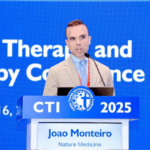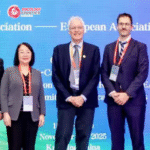

Editor’s Note
On November 8, 2025, during the China Conference on Holistic and Integrative Oncology (CCHIO), the China Anti-Cancer Association (CACA) and the American Association for Cancer Research (AACR) jointly hosted the “CACA–AACR Summit — 2025 China–U.S. Health Bridge and Cancer Prevention & Control Academic Event” in Kunming.
The summit brought together key representatives from both CACA and AACR to engage in in-depth discussions on the current landscape of cancer prevention and control, the strategic roles of the two organizations in global oncology, advances in cancer diagnosis and treatment, and future directions for international collaboration—further strengthening China–U.S. cooperation in the fight against cancer.

Group Photo of Experts (From left to right: Professor Frederic Biemar, Ms. Li Xin, Professor Wang Ying, Academician Zhan Qimin, Professor Lillian Siu, Professor Zhang Ning, Professor Yan Li, Professor Li Xiaoling)
At the beginning of the summit, Ms. Li Xin, Head of the Americas Division and Senior Officer (Fifth-Level) of the China Science and Technology Exchange Center (CSTEC)—a co-organizer of the event—delivered the opening remarks.
She reviewed the original intention behind CSTEC and CACA jointly launching the CACA–AACR Summit and highlighted CSTEC’s important role in promoting international scientific and technological collaboration. Ms. Li emphasized that cancer is a global challenge and expressed hope that China and the United States will continue to strengthen cooperation and jointly enhance cancer prevention and control capabilities.
Ms. Li Xin
Professor Li Xiaoling, Executive Chair of the CACA–AACR Summit and Tianjin Tumor Hospital Airport Hospital, stated that the goal of this summit is to share breakthrough research, spark innovative thinking, and build collaborative partnerships that will shape the future of oncology. She emphasized that the event serves as a “China–U.S. Health Bridge,” reflecting the shared vision of scholars from both countries.
Professor Li also highlighted the Summit Chairs:
- Academician Zhan Qimin, President of the Peking University International Cancer Institute,
- and Professor Lillian Siu, President of the American Association for Cancer Research (AACR).
Their joint leadership, she noted, symbolizes the deepening collaboration between China and the United States in the global fight against cancer.
Professor Li Xiaoling
Under the joint moderation of Professor Yan Li, Executive Director of the US–China Anti-Cancer Association (USCAC); Professor Zhang Ning of the Peking University International Cancer Institute; and Professor Li Xiaoling of Tianjin Tumor Hospital Airport Hospital, the summit formally transitioned into its academic program.

Session chaired by Professor Yan Li and Professor Li Xiaoling

Session chaired by Professor Zhang Ning and Professor Li Xiaoling
Professor Frederic Biemar, Vice Chair of the AACR Education Department, provided a detailed overview of AACR’s mission and activities in the Asia–Pacific region. He emphasized that AACR is a global organization dedicated to advancing cancer prevention and treatment through research, education, collaboration, and policy advocacy.
He introduced AACR’s major initiatives, including the AACR Annual Meeting, specialized research working groups, campus- and city-based educational programs, and research funding mechanisms that support scientists worldwide.
Professor Biemar highlighted AACR’s active efforts to expand partnerships across the Asia–Pacific region. He noted that AACR plans to launch campus-based activities in China, encourages Chinese scholars to join the association, and welcomes researchers to publish their work in AACR journals such as Cancer Discovery, thereby fostering shared progress in the fight against cancer.

Professor Frederic Biemar
Professor Wang Ying, Vice President of the China Anti-Cancer Association (CACA), presented an in-depth overview of China’s current cancer prevention and control landscape. She noted that in 2022, China recorded 4.82 million new cancer cases and 2.57 million cancer deaths, representing a substantial portion of the cancer burden in Asia and globally.
Professor Wang highlighted three major challenges facing China’s cancer control efforts:
- Population aging,
- Shifts in the cancer spectrum, and
- Relatively low five-year survival rates.
Guided by the State Council’s Opinions on Implementing the Healthy China Initiative, China has prioritized early screening, early diagnosis, and early treatment, achieving a five-year survival rate of 43.3%—a significant improvement, though still lagging behind developed countries.
To strengthen cancer control, CACA will continue advancing a broad range of initiatives, including:
- Hosting the CCHIO Annual Conference,
- Promoting the China Guidelines for Holistic Integrative Oncology,
- Expanding training programs for primary healthcare providers,
- Launching clinical research and GCP training,
- Enhancing publication efforts such as the periodical Holistic Integrative Oncology (HIO),
- And supporting the growth of the World Association of Integrative Oncology (WAIO).
Through these collective actions, CACA aims to elevate China’s cancer prevention and control capabilities and work closely with international organizations to confront the global cancer challenge.
Professor Wang Ying
Professor Lillian Siu, President of the American Association for Cancer Research (AACR), focused her presentation on AACR’s global development and its expanding collaborations with China. She outlined AACR’s strategic plans to strengthen engagement with Chinese researchers and institutions, and she shared the latest updates from the FDA–AACR Joint Working Group on emerging clinical trial endpoints.
Professor Siu noted that China’s role in global biomedical research has grown significantly in recent years. Abstract submissions from China now account for 8% of all abstracts presented at the AACR Annual Meeting. Looking ahead, she announced that in 2026, AACR will host the AACR New Drug Development Conference, co-organize the China–U.S. CACA–AACR Summit, and establish the AACR Asian and Asian-American Research Working Group, all of which will further deepen collaboration with China.
She also highlighted that in September 2025, the FDA and AACR convened a major workshop that identified several new clinical trial endpoints suitable for accelerated approval pathways. However, she emphasized that any new surrogate endpoints must undergo rigorous validation, including meta-analytic evidence demonstrating correlation with survival outcomes.
Professor Siu encouraged enhanced multi-stakeholder collaboration to advance the development and application of novel surrogate endpoints across clinical studies in multiple cancer types.
Professor Lillian Siu
Academician Zhan Qimin, President of the Peking University International Cancer Institute, provided an in-depth interpretation of genomic analyses and molecular classification of esophageal squamous cell carcinoma (ESCC). As a cancer type with distinct epidemiological and biological characteristics in China, ESCC differs significantly from esophageal cancers commonly seen in Europe and North America.
Academician Zhan explained that his team conducted large-scale multi-omics analyses on extensive ESCC patient samples, identifying previously unrecognized driver genes and molecular subtypes. These discoveries offer new avenues for the development of targeted therapies and precision interventions.
He emphasized that this research framework can be extended to other squamous cell carcinomas, thereby accelerating the advancement of precision oncology across multiple tumor types.

Academician Zhan Qimin
Professor Patricia LoRusso, former President of AACR and a leading expert at the Yale Cancer Center, reviewed the historical evolution of cancer diagnosis and treatment and provided an overview of advances in precision therapy for solid tumors.
She emphasized that the deepening understanding of tumor biology has directly driven the development of modern cancer therapeutics. Rapid progress in tumor genomics, transcriptomics, immunomics, epigenetics, and spatial biology has enabled the identification of diverse biomarkers, supporting increasingly precise cancer diagnosis and treatment.
These scientific advances have profoundly expanded clinicians’ understanding of malignancies, accelerated the emergence of novel diagnostic and therapeutic tools, and laid a solid theoretical foundation for new drug development and the continued growth of the oncology field.

Professor Patricia LoRusso
At the conclusion of the meeting, Academician Zhan Qimin, Chair of the Summit, and Professor Lillian Siu delivered closing remarks.
Professor Lillian Siu highly praised the success of the event, expressing her hope that CACA and AACR will continue to deepen collaboration in scientific research, education, and multiple other domains. She also invited participating experts to attend the 2026 AACR Annual Meeting, encouraging continued scientific exchange and cooperation.
Academician Zhan Qimin noted that the summit had been highly productive and offered new insights into the cooperation between CACA and AACR. He emphasized that cancer is a common enemy of humanity, and that collaboration between China and the United States is essential for facing this global challenge.

Academician Zhan Qimin and Professor Lillian Siu
This summit, through high-level dialogue, strengthened the partnership between China and the United States in the field of oncology and laid a solid foundation for future joint research, data sharing, and improved patient outcomes. Experts unanimously agreed that global collaboration is essential to accelerating breakthroughs in cancer prevention and treatment.


